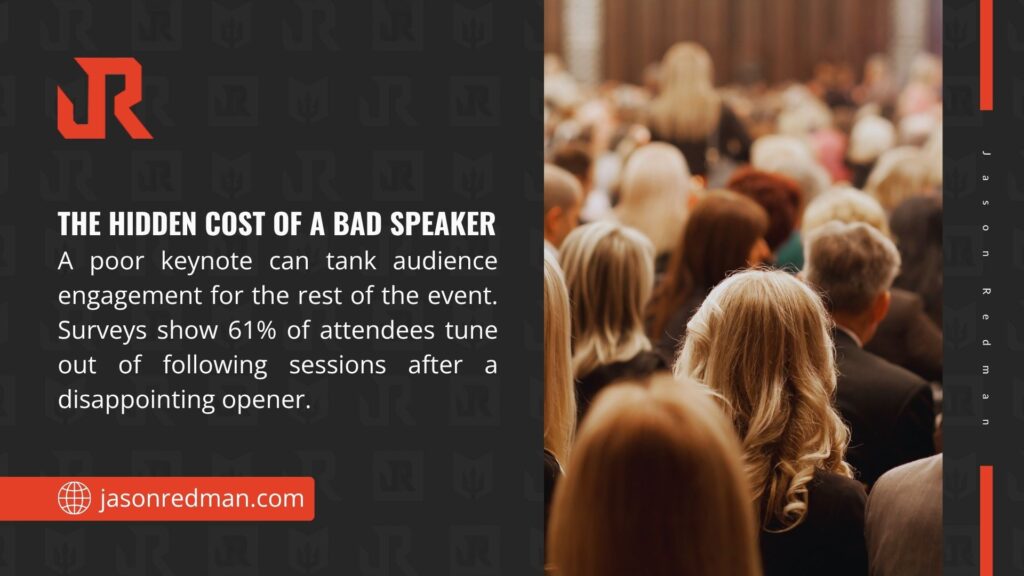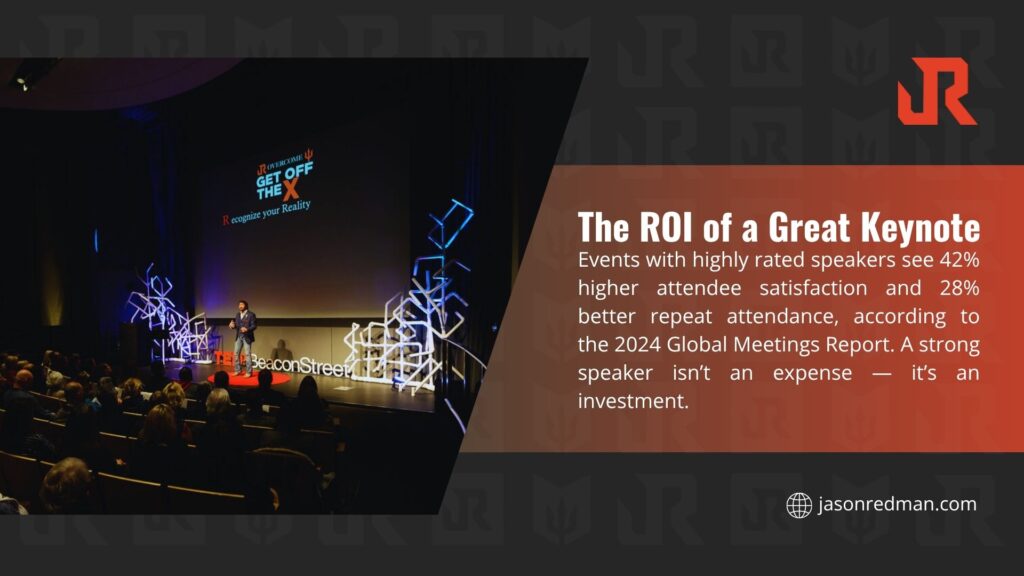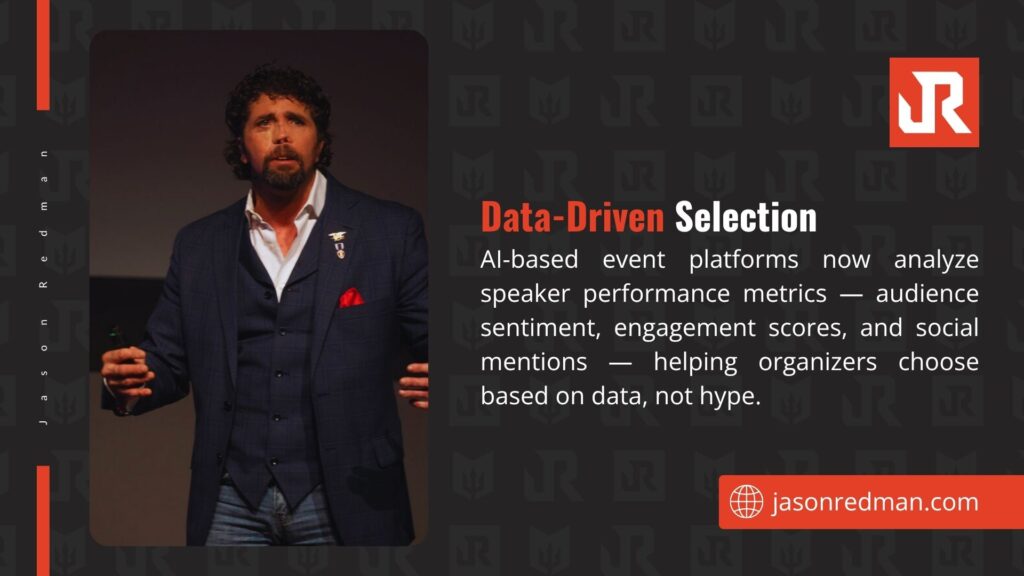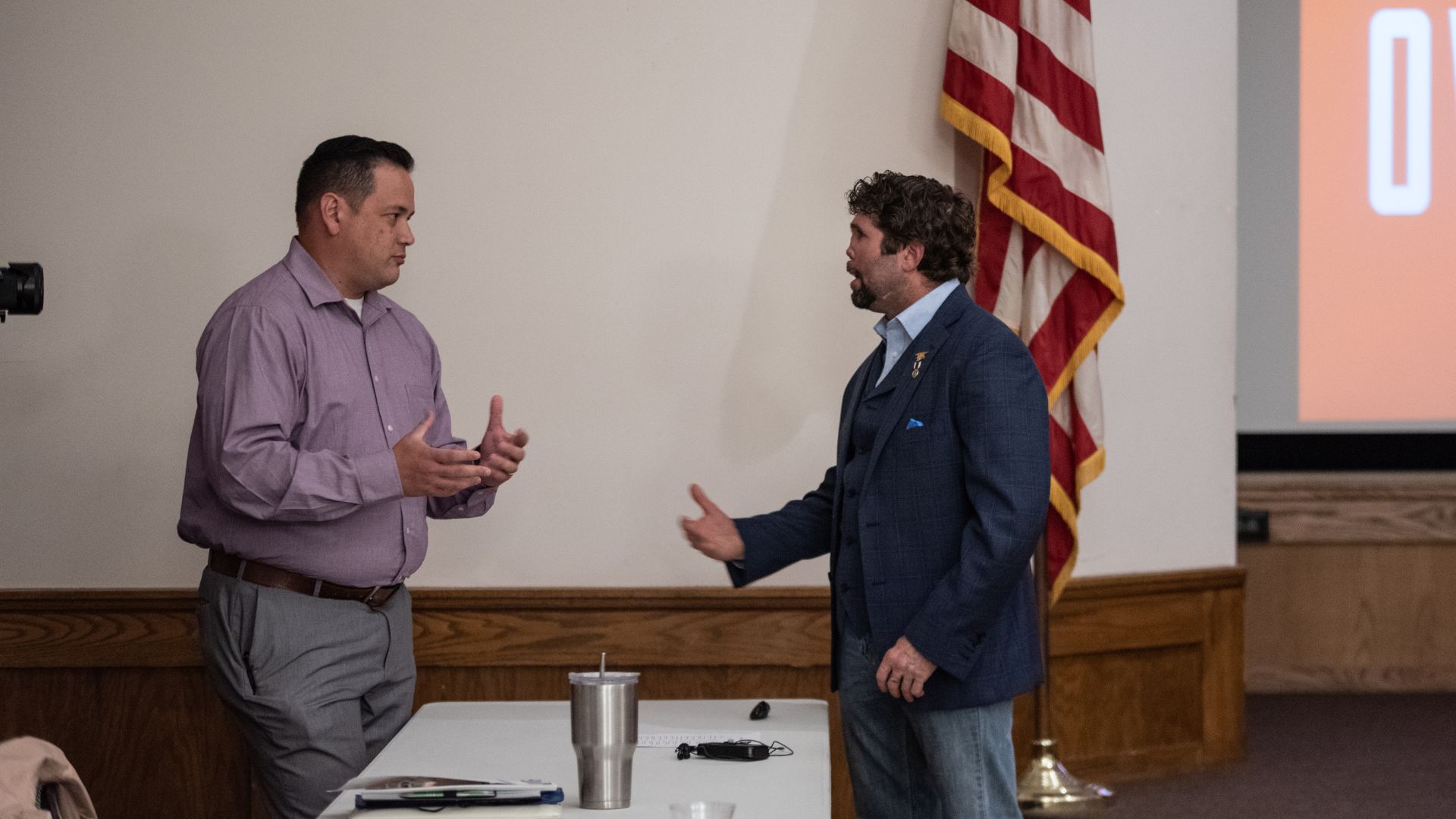Ever sat through a keynote that made you want to fake a medical emergency just to escape? Yeah, we all have. Some guy droning on about “synergy” and “paradigm shifts” while everyone’s checking how much phone battery they’ve got left.
78% of people come back to events specifically because of good speakers. But book the wrong person and you’ve just torched your budget and your reputation.
The speaker you pick can make or break everything. Get it right and people talk about your event for months. Get it wrong.. And no one will appear at your events anymore.
The 2024 Speaking Industry Benchmark Report shows nearly two-thirds of speakers say finding gigs is harder than ever which means you’ve got plenty of people willing to take your money and underdeliver.
What You’re Paying For (And What You’re Not)
A keynote speaker is your headliner. The person who sets the tone for the whole event. Usually 45-60 minutes of them trying to inspire, educate, or light a fire under your audience.
The good ones make 500 people feel like they’re having a one-on-one conversation. They read the room, adjust on the fly, know when to speed up or slow down. The bad ones read their slides out loud and wonder why everyone’s on their laptops.
Here’s what separates the pros from the frauds:
- They customize their content. Not just slapping your company logo on slide 2. Actually learning about your organization, your people, your challenges. If someone’s giving you the exact same talk they gave at fifty other events, you’re wasting money.
- They balance inspiration with takeaways. Rah-rah motivation is great for about ten minutes. Then people need actual substance they can use. The best speakers give you both.
- They’ve got presence. Some people just command a room. Can’t fake it. Either they’ve got it or they don’t. This is why watching video matters so much – you’ll know in five minutes if someone’s got that thing or if they’re putting audiences to sleep.
Different types of speakers work for different situations. A motivational speaker fires people up which is great for sales kickoffs or when the team’s going through hell. Industry experts teach which is perfect for professional development. Thought leaders challenge the way people think and this brings fresh perspectives but can be polarizing.
Celebrities pull in crowds and generate buzz, but you’re looking at $50K minimum and often way more.

Figure Out What You Need First
This is where most people screw up when learning how to book a speaker. They start browsing websites before they even know what they’re looking for.
That’s backwards.
Sit down and get brutally honest about what you’re trying to accomplish. Pump up a demoralized sales team? Educate people on new regulations? Celebrate hitting major goals? Each of these needs a completely different type of person.
Then think about who’s sitting in those seats. What keeps them up at night? What motivates them? What makes them roll their eyes? A speaker who crushes it with executives might not be that good with a frontline staff.
And yeah, budget. Set a real number. Not “we’ll figure it out”, an actual budget. Because if you fall in love with someone who charges three times what you can afford, you’re just wasting everyone’s time.
| What You’ll Pay | What You Get | Book Them When |
| $5K-$15K | Emerging speakers, solid content, working to prove themselves | Smaller events, tighter budgets |
| $15K-$40K | Known experts, proven track record, good customization | Corporate conferences, professional development |
| $40K+ | Big names, celebrities, ticket sale drivers | Major events, when you need buzz |
Where to Find Good Speakers?
You’ve got a few options. Some work better than others depending on your situation.
Speakers Bureaus
Call a speakers bureau. They’re usually free but they take their cut from the speaker’s fee. And you get someone who actually knows this world inside out.
A good bureau doesn’t just email you a list of names. They ask about your audience, your goals, your budget. Then they match you with speakers who actually fit.
They also handle all the annoying logistics. Contracts, travel arrangements, that stuff. Worth it just for that.
When you’re talking to bureaus, watch out for the ones who push a single speaker really hard. The good ones give you options and explain the pros and cons of each.
Ask Around
Sometimes the best way to figure out how to find a speaker for an event is just asking people who’ve done it. Hit up colleagues who’ve organized similar events.
People in your industry have dealt with the same challenges. They know who understands your world and who’s just faking it.
Check Out Authors and Bloggers
Some really good speakers aren’t professional speakers at all. They’re authors, podcast hosts, industry bloggers who also speak. They’ve already proved they can communicate and know their stuff.
Look for people writing for big publications in your industry. Whose articles get shared like crazy? Those people resonate with audiences.
Just make sure they’re comfortable on stage. Some brilliant writers freeze up in front of live crowds. Always ask for video before you commit.

How to Tell If Someone’s Actually Good (Not Just Good at Marketing)
Marketing materials can make anyone look amazing. Here’s how you can separate real talent.
Watch Them Work
Video research is non-negotiable. Don’t watch the polished highlight reel on their website – find full talks. See how they open, how they transition between points, how they wrap up.
Good speakers vary their delivery. They change pace, adjust volume, pause at the right moments. They engage the audience through questions and stories, not bullet points on slides.
Red flags? Speakers who read verbatim from slides. Never look at the audience. Use the same tired examples everyone’s heard a million times. You want someone with actual substance who can also command a stage.
If you’re looking at someone with a Navy SEAL background, authenticity matters. Real experience shows in specific details and lessons learned, not vague talk about being tough.
Make Sure They Know Their Stuff
What have they actually done? Built successful companies? Published real research? Led major changes? Or are they just good at talking?
Call their references. Ask specific questions. How was pre-event communication? Did they deliver what they promised? What was the audience feedback? Would you book them again?
Watch for people with inconsistent information across platforms. Legit speakers keep their credentials straight. Vague or contradictory stuff suggests they’re padding their resume.
Will They Customize?
Generic presentations rarely land well. In the 2024 report, 70% of speakers said topic relevance to their expertise matters most when taking gigs. But real customization goes way beyond picking the right topic.
Good speakers ask detailed questions about your organization. They want background materials such as annual reports, recent company news, internal stuff. They’re trying to understand your world.
Pay attention during initial conversations. Are they genuinely listening or just pitching their standard talk? Do they ask about recent organizational changes? Audience concerns? Their questions tell you if they actually care.
Ask for a preliminary outline showing how they’ll adapt content. Should reference organizational details, not just have your company name on generic slides.
The Process of Booking Someone
Once you’ve found the right person, do this part professionally to avoid problems later.
Start Early, Have Backup Plans
Good speakers book way ahead. Professional speakers need 3-6 months, known experts need 6-8 months, big-name celebrities need 8-12 months minimum. Start late and you’re stuck with whoever’s available.
Keep a list of your top 3-5 choices. Your first choice might be booked. Your second choice might cost more than you thought. You need options.
Check their online calendars before you reach out as this saves everyone time.
The Real Cost (Not Just the Speaking Fee)
The speaking fee is just part of it. Travel, hotel, meals, special AV equipment – add 20-30% to the base fee for someone flying in. Ask for detailed breakdowns upfront. What’s included? What costs extra? Are there charges for pre-event calls or customization work?
Some speakers flex on pricing for nonprofits, local events, or good exposure opportunities. Others have fixed rates no matter what. It doesn’t hurt to ask, just be respectful.
When you’re looking at motivational speaker costs, remember that value beats price. A $30K speaker who transforms your culture delivers better ROI than a $10K speaker who puts people to sleep.
Also Read: motivational navy seal speaker
Get Everything in Writing
Contracts should cover everything. Date, time, location, fee, payment schedule, travel expenses, AV requirements, recording rights, cancellation policies, customization expectations.
Be specific about customization.
- Will they interview leadership?
- Review organizational materials?
Put this in the contract so nobody’s surprised later. Address cancellation from both sides. What happens if the event gets postponed? If the speaker has an emergency? Clear terms prevent fights later.
Pick one person to handle all speaker communication. Too many cooks creates confusion and mixed messages.

Book a Speaker for Your Next Event
Understanding how to book a speaker comes down to this: define clear goals, research thoroughly, verify expertise through video and references, negotiate solid contracts, provide strong support.
The difference between a forgettable event and one people remember for months often comes down to one decision of who you put on that stage.
Jason Redman brings 35 years of special operations and entrepreneurial experience to stages worldwide. As a decorated Navy SEAL combat veteran who got shot multiple times, endured 37 surgeries, and came back stronger, I deliver authentic lessons about leadership, resilience, and overcoming adversity.
With over 700 speaking engagements for Fortune 500 companies, professional sports teams, military organizations, and schools, my message lands because it’s real. My presentations provide practical frameworks for getting off the X and taking action when challenges hit.


